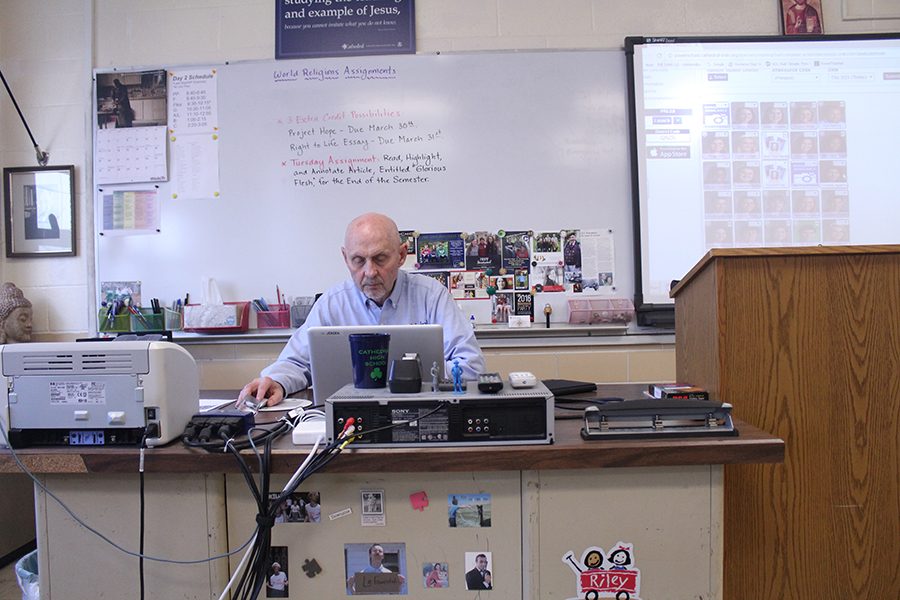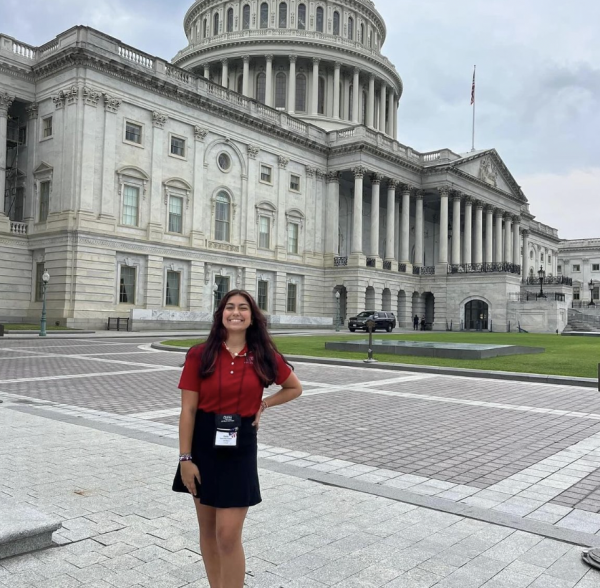Married priests? Teachers provide perspective
Pope Francis’s comments elicit responses
Recent media reports have suggested that His Holiness Pope Francis has indicated that he would be open, in some situations, to having married men ordained as Roman Catholic priests. This is a hot topic due to dwindling population of the priesthood. In an effort to increase the number of men ordained, having a husband double as a priest seems may be a compromise that addresses the current shortage of priests.
Theology teacher Mr. Ken Jensen provides a knowledgeable background about the issue and looks to shed light on the problem at hand.
Celibacy dates back to early origins of the faith with St. Peter. “The early centuries of the Church knew no such requirement. As the Scriptures say, even (he) had ‘a believing wife.’ Ancient theologians say it was done in order to keep the Church’s clergy holy,” Jensen said.
“When being a priest or bishop became potentially lucrative during the theocratic period of the church’s history, many clerics saw the priestly ministry as a career to perhaps be pursued,” he wrote in an email. Having a clergy riddled with greed could cause harm to the church’s image. “Consequently,” he said, “in a later council of the church, it was decided that candidates for the episcopacy be taken only from the monasteries, which guaranteed the choosing of men who had already abandoned worldliness and the trappings of success.”
Devoted men of the faith who lived solely with the faith were to be the future of the priesthood.
Jensen said he agrees that the abstinent lifestyle of a priest can push inquiries away and scare them off from the seminary. In addition, celibacy has put masculinity in a vice. “I think a case could be made that clerical celibacy has both thinned the number of priests available in the Catholic Church, and it may have put a strain on the normal maleness of many priests,” he said.
“If it can be proven that these dwindling numbers and the failures of many priests at being holy is due to this later (celibacy), then perhaps it could be argued that it is time to return to the ‘canon of exactness’ found in the Holy Scriptures,” he said. This “canon of exactness” refers to aged Biblical rules pertaining to marriage among priests being allowed.
“However, these decisions are way beyond my pay grade,” he said, “and belong to those filled with the Holy Spirit for determining these things according to the proper Holy Wind.”
A few of Jensen’s fellow teachers in the theology department voiced their opinions, all sharing a common sense of hope and acceptance for this possible change.
Theology teacher Ms. Katherine Klee: “If the decision were based on need, I would support it. Imagine the sacraments without a priest. The Catholic Church is blessed by her priests, especially in the sacraments. If the decision were not based on need and simply just for any married man to have the option, I would be wary of that. The duties, roles and obligations of a priest and a husband and father are too many in their own right. I would rather see a priest do a few of his respective roles well than multiple roles poorly, and the same goes for a husband and father.”
Theology teacher Mrs. Sara Koehler: “Of course we should ordain married men to the priesthood. We should have started this 50 years ago. We are in danger of losing the central sacrament of our faith, the Eucharist, if there are so few priests left to celebrate Mass.”
Theology teacher Mr. Quanah Jeffries: “I like that Pope Francis has said this. There can be great fruits that come from this. There are a couple of things to keep in mind, however, so as not to misunderstand what the Holy Father has said. First, if it happens it probably will not happen soon. A commission has not been set up yet to investigate this possibility, let alone the fine tuning of implementing such a change after recommendations from the commission and, most likely, feedback from bishops throughout the world
“If it happens, it is quite possible that it would be after Francis’s papacy. Second, Pope Francis specified that this would be a possible solution for rural areas that do not often see a priest. His words do not apply to nations such as our own.”







